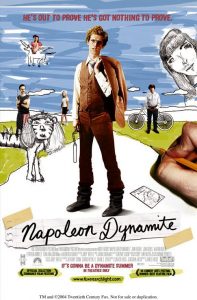 I saw Napoleon Dynamite yesterday afternoon. This is good, because now I only have one thing left to do before my trip. This is also good because I really, really liked it. It’s bad, though, because I have no clear idea how to express what about it I liked. I mean, even to myself. It has everything I don’t like in a movie. Deliberately framed shots that scream ‘look, I’m a movie over here!’ Characters in which I have no legitimate interest. Slice of life reality as the setting. A plot resolution that came essentially from nowhere. And yet, there’s some kind of perfect storm thing going on, because I thought that the combination of all the elements was great, such that none of them really even bothered me during the few times I wasn’t actively enjoying myself.
I saw Napoleon Dynamite yesterday afternoon. This is good, because now I only have one thing left to do before my trip. This is also good because I really, really liked it. It’s bad, though, because I have no clear idea how to express what about it I liked. I mean, even to myself. It has everything I don’t like in a movie. Deliberately framed shots that scream ‘look, I’m a movie over here!’ Characters in which I have no legitimate interest. Slice of life reality as the setting. A plot resolution that came essentially from nowhere. And yet, there’s some kind of perfect storm thing going on, because I thought that the combination of all the elements was great, such that none of them really even bothered me during the few times I wasn’t actively enjoying myself.
Perhaps it’s because everything touched by Mormons is pure gold.
Probably not, though. I know it was funny, but funny isn’t really enough to make me want to see it again and recommend it to people, by itself. Lots of things are funny. Most things don’t leave me with a goofy smile on my face just thinking about bits and pieces of it, or having a similarly goofy conversation last night with a friend who independently saw it for the first time the same day, with the whole ‘”Do you remember the cow?!” laugh of hilarity while everyone else stared at us’ thing going on. This did, though.
And, yeah, I eventually came to care what happened to a few of the characters. This is unusual, in movies where I don’t care during the first ten minutes or so.
You may note I haven’t described the plot. This is because I don’t even really know what that was, although I know a little better than I know why I liked it so much. In short, it’s about this kid in high school in Idaho, the template upon which high school geeks are drawn, and a snapshot of a few weeks in his life during which Things Change. Which still doesn’t say a lot, since that is (except for the character and duration being specified) that point at which any story should be told, if it expects to be even mildly interesting.
In short: Weird scenario, but funny. Mormons. Good, but I can’t say why exactly. Is this review worthless? I think it is.
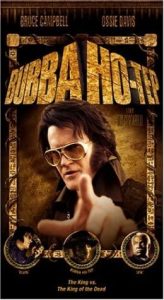 Sure, there are lots of mummy movies. Like the one with Brendan Fraser and the one with Abbott & Costello. And there are lots of JFK movies, like the one with Martin Sheen and the one by Oliver Stone. And there are lots of Elvis movies, like, um… y’know, it’s weird that people don’t make Elvis movies, but I guess there’s still Jailhouse Rock and the one with the clambake.
Sure, there are lots of mummy movies. Like the one with Brendan Fraser and the one with Abbott & Costello. And there are lots of JFK movies, like the one with Martin Sheen and the one by Oliver Stone. And there are lots of Elvis movies, like, um… y’know, it’s weird that people don’t make Elvis movies, but I guess there’s still Jailhouse Rock and the one with the clambake.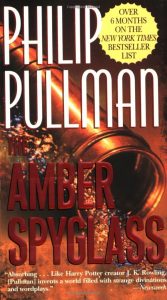 All things considered, I’d rather live in the parallel universe where Philip Pullman wrote a better conclusion to his fairly nifty parallel universe trilogy, His Dark Materials.
All things considered, I’d rather live in the parallel universe where Philip Pullman wrote a better conclusion to his fairly nifty parallel universe trilogy, His Dark Materials.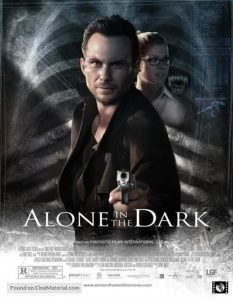 The first good thing I can say about
The first good thing I can say about 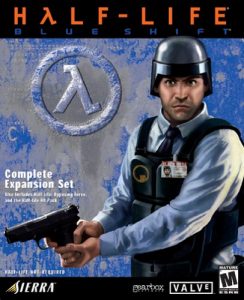 Last night, I got around to hooking up my new computer speakers. Once you have an upgrade like that, your only choice is to dig out a new game. Conveniently, I had an old new game laying around, in the form of
Last night, I got around to hooking up my new computer speakers. Once you have an upgrade like that, your only choice is to dig out a new game. Conveniently, I had an old new game laying around, in the form of 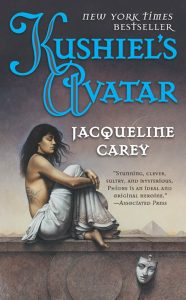 One of the unfortunate things I’ve run into while doing this is just how many series of books I’m in the middle of. It seems like every other book I review, I have to go back and review the rest of the series, too. It’s not like I can assume that just because I’ve read the earlier books, everyone has (although I only do this with the first book I review of a series, which implies I assume that any reader is intimately familiar with the contents of my endeavour here, and what does that say about me?), and so I have to review the series at the same time as the book. (Note to authors: this is not a valid excuse to recap your entire series in the process of writing each new book. Assume we’ve read the earlier ones. Please.) Still, the number of series I’m in the middle of with no review yet is shrinking, so that’s nice.
One of the unfortunate things I’ve run into while doing this is just how many series of books I’m in the middle of. It seems like every other book I review, I have to go back and review the rest of the series, too. It’s not like I can assume that just because I’ve read the earlier books, everyone has (although I only do this with the first book I review of a series, which implies I assume that any reader is intimately familiar with the contents of my endeavour here, and what does that say about me?), and so I have to review the series at the same time as the book. (Note to authors: this is not a valid excuse to recap your entire series in the process of writing each new book. Assume we’ve read the earlier ones. Please.) Still, the number of series I’m in the middle of with no review yet is shrinking, so that’s nice.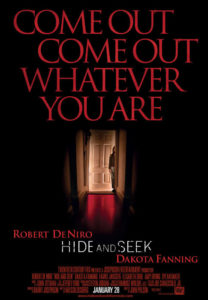 The thing is, this was a good movie. Several inevitable games of
The thing is, this was a good movie. Several inevitable games of